- Home
- Elizabeth Peters
Night Train to Memphis vbm-5
Night Train to Memphis vbm-5 Read online
Night Train to Memphis
( Vicky Bliss Mystery - 5 )
Elizabeth Peters
Vicky Bliss is the first to admit she doesn't know a thing about Egyptology. But her familiarity with criminality brings an intelligence agency to her office with an offer she can't refuse: they want her as an undercover operative on a luxury Nile cruise because certain information has come their way that a major theft of Egyptian antiquities is in the works.Vicky suspects the man they are seeking is her occasional lover and frequent adversary, Sir John Smythe.Then, on the first day of her Nile cruise, she spots him - with a beautiful woman clinging to his arm.Stunned and furious, Vicky is too preoccupied with her own feelings to concentrate on crime on the cruise - but then one of the crew is brutally murdered and Vicky finds she must put all her emotions aside and join forces with her duplicitous lover if she wants to solve the case...
ELIZABETH PETERS was born and brought up in Illinois. She is a prolific and successful novelist with over fifty novels to her credit and is internationally renowned for her mystery stories. Mrs Peters lives in a historic farmhouse in Frederick, Maryland, with six cats and one dog.
Praise for Elizabeth Peters
‘A writer so popular that the library has to keep her books under lock and key.’
Washington Post Book World
‘Elizabeth Peters has always known how to romance us.’
New York Times Book Review
‘I really do think Elizabeth Peters’ books are great entertainment.’
Angela Rippon
‘The perfect recipe for splendid entertainment!’
Maxim Jakubowski, Guardian
Also by Elizabeth Peters
The Amelia Peabody
murder mystery series:
(Titles listed in order)
Crocodile on the Sandbank
The Curse of the Pharaohs
The Mummy Case
Lion in the Valley
The Deeds of the Disturber
The Last Camel Died at Noon
The Snake, the Crocodile and the Dog
The Hippopotamus Pool
Seeing a Large Cat
The Ape Who Guards the Balance
The Falcon at the Portal
Thunder in the Sky
Lord of the Silent
The Golden One
Children of the Storm
Guardian of the Horizon
The Serpent on the Crown
Tomb of the Golden Bird
The Vicky Bliss
murder mystery series:
(Titles listed in order)
Borrower of the Night
Street of the Five Moons
Silhouette in Scarlet
Trojan Gold
Night Train to Memphis
Constable & Robinson Ltd
3 The Lanchesters
162 Fulham Palace Road
London W6 9ER
www.constablerobinson.com
First published in the USA by Warner Books Inc., 1995
This UK paperback edition published by Robinson,
an imprint of Constable & Robinson Ltd, 2008
Copyright © Elizabeth Peters, 1995, 2008
All rights reserved.
For Sharyn McCrumb
with love and thanks
Acknowledgments
AT THE RISK of sounding like a giddy young first-published author who thanks everybody except the electrician, I must acknowledge the assistance of many friends and friendly experts in writing this book. I couldn't have got myself or Vicky to Amarna without the help of Dennis Forbes, editorial director of K. M. T. (A Modern Journal of Ancient Egypt), and that journal’s special projects editor, George B. Johnson. They were mines of information and the most congenial of fellow-travellers. Kent Weeks of the American University in Cairo good-naturedly informed me that I couldn't possibly get Vicky away from Amarna via the route I had proposed, and suggested an alternative. Peter Dorman, director of the Oriental Institute’s Epigraphic Survey, and his wonderful crew at Chicago House fed me, instructed me, entertained me, and dragged me up and down the cliff of the West Bank searching for an imaginary tomb. Practically everybody connected with the American Research Council in Egypt amiably endured my pressing inquiries and pervasive presence: Terry Walz, executive director; Mark Easton, Cairo director, and Mark’s associate Barbara Fudge and Amira Khattab. To all of them, my affectionate thanks.
The basic inspiration for the book came from an earlier trip to Egypt and the two friends who accompanied me on a Nile cruise. One couldn’t ask for more delightful companions than Charlotte and Aaron Elkins, and there is no truth whatever to the rumour that I stole my plot from Aaron. I tried, but he was too clever for me.
The title of the book originated while I was meeting with a group of fellow mystery writers. This group convenes each year, purportedly for the purpose of carrying on professional discussions, and we actually were carrying on a professional discussion when I asked plaintively, ‘What the Hades am I going to call this book?’ The answer came, as it usually does, from Sharyn McCrumb. I thought it was a great title, but I failed to recognize the source; my ignorance prompted Sharyn to lecture me on the subject of country-western music and to supply me with various research materials. As a result I am now a convert, which may explain some of the esoteric references in this volume. I would offer a prize to the reader who can spot the most songs, except I’m sure Sharyn would win it.
Sharyn is also the author of ‘You’re a Detour on the Highway to Heaven,’ in which endeavour she acknowledges some assistance from Joan Hess and Dorothy Cannell. Joan and Dorothy claim the assistance was considerable, amounting to actual collaboration. I have no further comment to make on this subject, except to say that my debt to these writers and the other non-members of the organization to which they and I belong is profound.
None of the individuals mentioned is responsible for any errors I may have made in recording the information they gave me. The views expressed are those of the characters, who are, I hardly need say, entirely fictitious. The tomb of Tetisheri is also fictitious. For reasons that should be apparent I could not use an actual, known tomb, so I invented one. (A real tomb of Tetisheri may yet be found, though such an eventuality is, in my opinion, unlikely. If this happens, bear in mind it isn’t the same tomb as mine.) The particular Fourth Dynasty cemetery at Abydos to which I have referred is also apocryphal. I think. One never knows what is going to turn up in Egypt.
There are, of course, many museums in Cairo. The proper name of the one to which my characters constantly and carelessly refer is The Egyptian Museum.
Vicky’s comments on the problems of conservation faced by overworked and underfunded antiquities organizations are unfortunately only too accurate. The problem is acute; positive, public support is badly needed, especially for organizations such as the Epigraphic Survey, which for many years has concentrated on making accurate copies of fading reliefs and inscriptions. If we cannot preserve all the monuments – and we cannot – we can at least record them before they vanish forever.
YOU’RE A DETOUR ON THE HIGHWAY TO HEAVEN
(To: Great Speckeld Bird)
When Mama lay a-dyin’ on the flatbed,
She told me not to truck with girls like you;
But I was blinded by the glare of your headlights,
And went joy-ridin’ just for the view.
CHORUS:
You’re a detour on the highway to heaven,
I am lost on the backroads of sin,
I have got to get back to the four-lane,
So that I can see Mama again.
Your curves made me lose my direction,
My hands from the steering wh
eel strayed,
But you were just one more roadside attraction,
It’s been ten thousand miles since I prayed.
If you ever get out of the fast lane
And get back to that highway above,
I’ll be waiting for you at the tollbooth,
In that land where all roads end in love.
Chapter One
I
THE MOUNTAIN meadow was carpeted with fresh green and starred with small, shy flowers. He came towards me, walking so lightly the grass scarcely seemed to bend under his feet. His hair shone silver-gilt in the sunlight, and he was smiling, and his blue eyes held a look I had seen in them only once before. Trembling, I waited for him to come to me. He stopped a few feet away, still smiling, and held out his hands.
They were wet and red and dripping. I looked from his bleeding hands to his face and saw blood erupt from it in spurting streams, from the corners of his mouth, from under the hair on his temples. Bright scarlet patches blossomed on the breast of his shirt. There was blood everywhere, covering him like a red rain. I stretched out my arms but I couldn’t reach him and I couldn’t move and the scream I tried to utter wouldn’t come out of my throat and he fell, face down at my feet, and the back of his head wasn’t golden fair but sticky scarlet and the blood spread out, staining the green grass and drowning the shy flowers and still I couldn’t reach him . . .
‘Oh God, oh God, oh God . . .’ Somebody was whining. It wasn’t I. I was blubbering and swearing – or was I praying?
Swearing. ‘Damn him, damn him!’ I reached out blindly in the dark. There was something monstrous and hairy on my bed. I threw my arms around it and clutched it to my bosom.
Caesar stopped whining and began licking my face with frantic slurps. Caesar is a Doberman; his tongue is as rough as a file and about a foot and a half long. He has very bad breath.
‘All right, okay,’ I gasped, fending him off and reaching for the bedside lamp.
The light helped, and so did the sight of my familiar messy bedroom, but I was still shaking. God! That had been the worst one yet.
Caesar’s furry face stared worriedly at me. He wasn’t allowed on the bed. I must have cried out in my sleep, and the gallant dog had leaped up to my rescue.
Clara was allowed on the bed. Caesar hasn’t got over the injustice of this yet, but he can’t do anything about it because he is terrified of Clara, who weighs approximately seven pounds to his seventy. I think he thinks she is a god. He slobbers with delight when she condescends to curl up next to him, and grovels when she raises a paw. She had retreated from her usual position, on my stomach, to the foot of the bed and was sitting up, eyeing me with that look of tolerant contempt only Siamese cats have fully mastered. In the dark seal-brown of her face her eyes looked very blue.
A shudder twisted through me as I remembered how blood had filled those other blue eyes.
It was the third time that week I had dreamed about John. The first one hadn’t been bad, just an ordinary anxiety/frustration dream in which I pursued a familiar form along endless streets only to find, when I caught up with it, that it wore someone else’s face. The second . . . well, never mind the details of that one. The metamorphosis of the body I clasped into a scaled, limbless creature that slid slimily through my arms and vanished into darkness had left a nasty memory, but it hadn’t awakened me.
I knew the cause of the dreams. My subconscious doesn’t fool around; it’s about as subtle as a brickbat. I had told myself there was nothing to worry about, even if I hadn’t heard from him for over a month, and I had believed it – sort of – until a week ago. Hugging my warm, hairy, smelly dog as a child would clutch a teddy bear for comfort, I remembered the conversation that had forced me (or my subconscious) to admit there was something to worry about.
II
‘But I don’t know anything about Egyptology!’ I yelled.
Normally I don’t yell when I say things like that. I mean, it’s hardly the sort of statement that arouses passionate emotions. But this was the fourth time I had said it, and I didn’t seem to be getting the point across.
The two men behind the desk exchanged glances. One of them was my old friend Karl Feder of the Munich Police Department. The other man was about the same age-mid-fifties, at a guess. Like Karl, he was losing his hair and starting to spread around the middle. He had been introduced to me as Herr Burckhardt, no title, no affiliation. If he was a colleague of Karl’s he had to be a cop of some variety, but I had only known one other man with eyes as cold as his, and Rudi had definitely not been a police officer.
I knew what they were thinking. It was Burckhardt who said it. ‘I fail to understand, Dr Bliss. You are an official of our National Museum, a well-known authority on art history. The Herr Direktor, Doktor Schmidt, has often said that you are his most valued subordinate.’
‘Yeah,’ I said gloomily. ‘I’ll bet he has.’
Schmidt has a mouth almost as big as his rotund tummy. He is as cute as one of the Seven Dwarfs and not much taller, and if he wasn’t so brilliant he’d have been locked up long ago as a menace to society. Not that he’s a crook. On the contrary; Schmidt thinks of himself as a brilliant amateur sleuth, the scourge of the underworld, and of me as his side-kick. As Watson was to Sherlock, as Archie was to Nero Wolfe, so Vicky Bliss is to Herr Doktor Anton Z. Schmidt. At least that’s how Schmidt looks at it. My own view of our respective roles is somewhat different.
I said slowly and patiently, ‘Human beings have been producing works of art of one kind or another for over thirty-five thousand years. Even if you include only the major visual arts and restrict yourself to Western art, you have to start with Stone Age man, proceed through the Egyptians and the Minoans and the Etruscans and the Greeks, to early Christian art and Byzantine and medieval and Renaissance and . . . Oh, hell. What I’m trying to say is that nobody can be an expert on all those fields. My specialty is medieval European art. I don’t know – ’
‘What about the Trojan gold?’ Feder inquired. ‘That does not come under the heading of medieval European art, does it?’
I had been afraid somebody was going to bring that up.
Schmidt refers to the affair of the Trojan gold as ‘our most recent case.’ He doesn’t often refer to it, however, because it had not been one of ‘our,’ most resounding successes. People had been looking for the gold, a hoard of priceless ancient jewellery which had vanished from besieged Berlin at the end of World War II, for almost fifty years. Educated opinion believed the Russians had carried it off to Moscow. Schmidt and I and a few other people had spent several weeks the previous winter following up a clue that suggested it had been smuggled out of Berlin before the Russians entered the city, and hidden somewhere in Bavaria. At one point I thought I had found the hiding place. Turned out I was wrong. Schmidt was still complaining about how I had misled him. Which I hadn’t, not deliberately. I had been – well – wrong. Sometimes I am wrong.
Not this time, though, dammit. Feder was smirking at me as if he had said something clever. He was correct. The Trojan gold could not be described as medieval art.
I tried again. ‘That had nothing to do with my expertize or lack thereof. It was pure chance.’
‘But you recognized, from a bad photograph, that the jewels pictured were genuine. Some degree of expertize – ’
‘Anybody could have done that!’ My voice rose. ‘The gold of Troy is famous. Everybody knows about it. Almost everybody . . . Let me put it this way, meine Herren; I could not pose as an expert on Egyptian art for more than five minutes without getting caught out. If I understand you correctly, you are suggesting I accept the position of guest lecturer on a Nile cruise. In exchange for a free tour I will be expected to talk at least once a day on some damned temple or pyramid, and be prepared to answer questions from the people taking the cruise, who wouldn’t be taking the cruise if they weren’t already interested in and informed about the subject. Five minutes, hell! I wouldn’t last sixty seconds. Why
me, for God’s sake? There are hundreds of people who know more about the subject than I do.’
‘But my dear Fräulein Doktor!’ Burckhardt exclaimed. ‘Look at it this way. Never again will you have the opportunity for such a holiday. This is a luxury cruise; the boat is new, designed for millionaire tourists – suites instead of rooms, gourmet food, the best of everything. Passengers will be admitted to places that are barred to the ordinary tourist, the lecturers are all distinguished scholars – ’
He waved a brightly coloured brochure at me. I shied back. ‘That’s just the point, Herr Burckhardt. Karl, will you please tell your friend that I am not an empty-headed blond bimbo, even if I do look like one.’
Lately I’d been trying very hard not to look like one, swathing my too well endowed torso in loose jackets and my long legs in full skirts that flapped around my calves. I had let my hair grow long so I could wind it into a schoolmarmish bun. Nothing seemed to work. If you are tall and blond and blue-eyed and shaped like a female, some people assume you don’t have a brain cell working.
Karl tried to hide his smile. ‘I warned you this approach would not work, Burckhardt. The lady is very astute. I imagine she already suspects why we are making this request.’
I nodded gloomily. It didn’t require a high degree of intelligence. The affair of the Trojan gold was only the most recent of several encounters I have enjoyed with the criminal element, if ‘enjoyed’ is the right word. I do not enjoy being shot at, assaulted, kidnapped, and chased across the countryside. I didn’t want to do that anymore.
‘Something is going to happen on that cruise,’ I said. ‘What is it? Murder, hijacking, or just a simple case of grand theft which could easily lead to murder or hijacking?’
‘If you will allow me to explain,’ Burckhardt began.

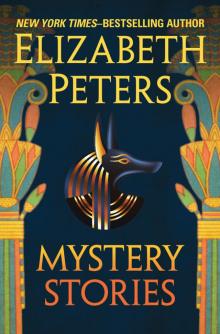 Mystery Stories
Mystery Stories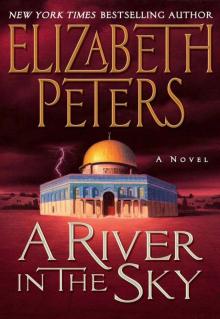 A River in the Sky
A River in the Sky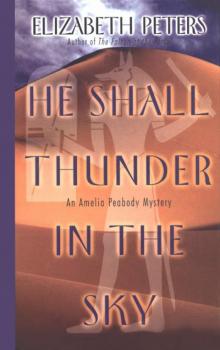 He Shall Thunder in the Sky taps-12
He Shall Thunder in the Sky taps-12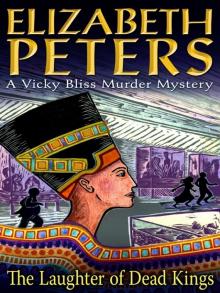 Laughter of Dead Kings vbm-6
Laughter of Dead Kings vbm-6 Silhouette in Scarlet vbm-3
Silhouette in Scarlet vbm-3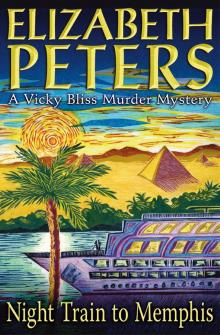 Night Train to Memphis vbm-5
Night Train to Memphis vbm-5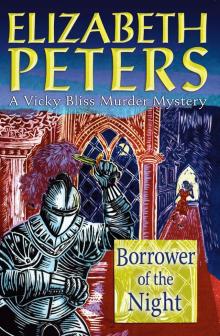 Borrower of the Night vbm-1
Borrower of the Night vbm-1 The Golden One
The Golden One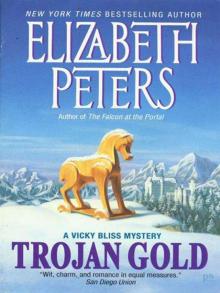 Trojan Gold vbm-4
Trojan Gold vbm-4 Crocodile On The Sandbank
Crocodile On The Sandbank